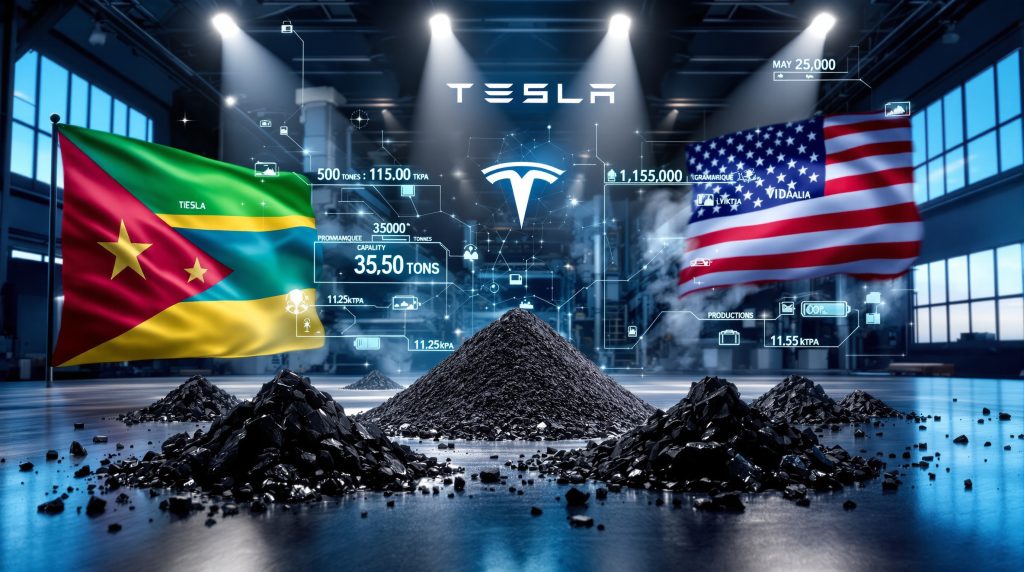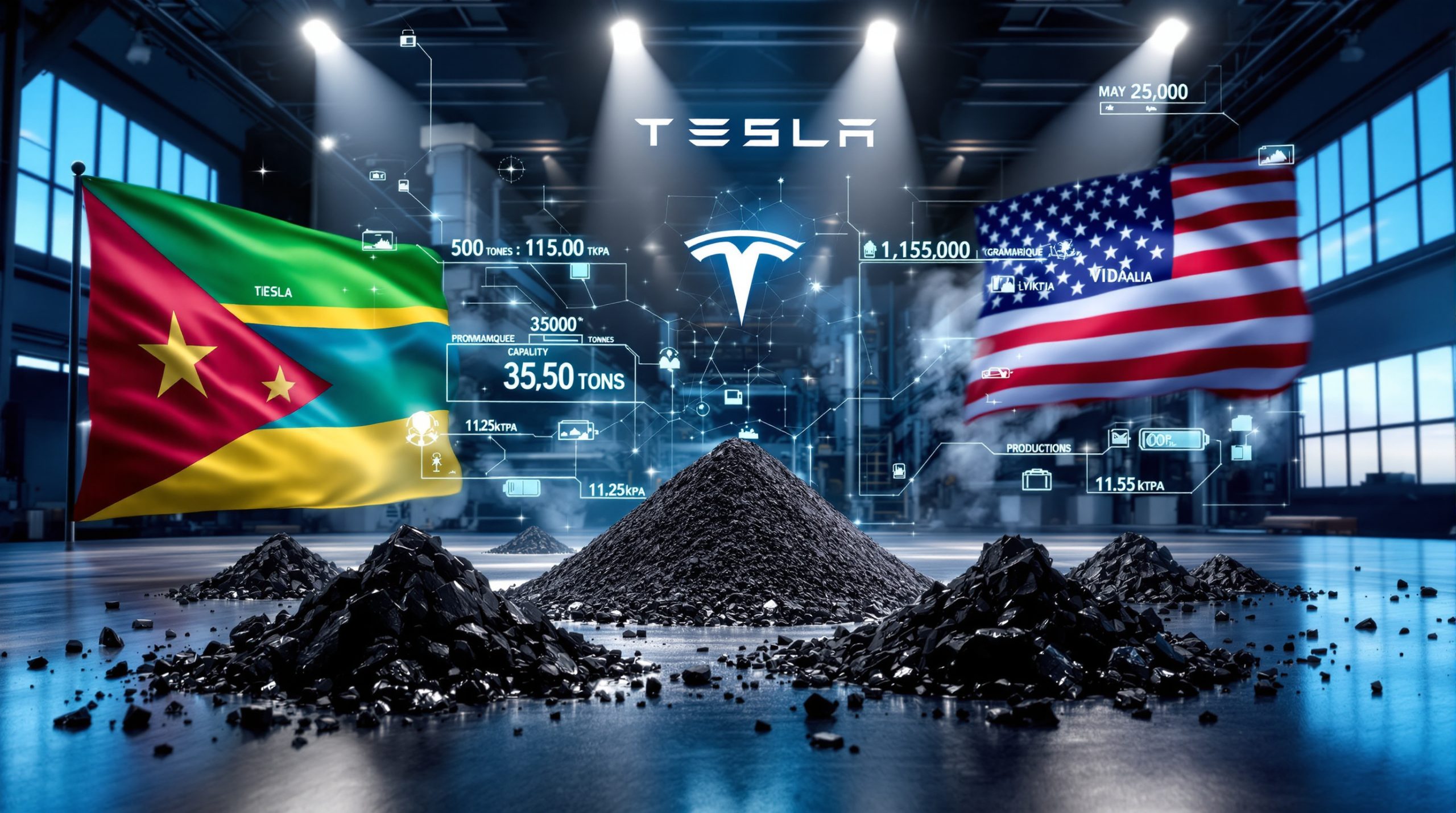What Makes the Syrah-Tesla Graphite Partnership Strategically Important?
The Syrah and Tesla graphite supply agreement represents a pivotal development in establishing domestic battery material supply chains for the United States electric vehicle industry. This partnership extends beyond typical supplier relationships, positioning itself as a cornerstone of American energy independence strategy. Furthermore, the agreement aligns with broader efforts to develop a critical minerals reserve that reduces dependency on foreign suppliers.
Breaking Down the 8,000-Tonne Supply Agreement Structure
The contractual framework between Syrah Resources and Tesla encompasses 8,000 metric tonnes of active anode material delivered over a four-year period, establishing one of the most significant graphite supply partnerships outside Chinese control. This agreement, originally structured in 2021, targets Tesla's expanding battery production requirements while supporting the automaker's supply chain diversification objectives.
Revenue implications for Syrah extend beyond immediate contract value, creating a foundation for expanded battery material production capabilities. The 11.25 kilotonne per annum (ktpa) capacity at the Vidalia facility commenced operations in Q1 2024, positioning the company as Tesla's primary non-Chinese graphite anode supplier.
Strategic timing aligns with Tesla's aggressive battery production scaling plans, supporting the company's goal of reducing dependency on volatile international supply chains. The partnership provides Tesla with domestic sourcing alternatives during a period of intensifying geopolitical tensions affecting critical mineral access.
Why Tesla Chose Syrah's Vidalia Facility Over Chinese Suppliers
Tesla's selection of Syrah's Louisiana-based processing facility reflects deliberate strategic positioning away from Chinese graphite market dominance. Geopolitical considerations drive this decision, as Chinese suppliers maintain overwhelming control over global graphite processing capacity, creating supply vulnerability for American manufacturers. This strategic move parallels the US mineral production order that prioritises domestic supply chain development.
The Vidalia facility's domestic U.S. processing capabilities eliminate international shipping dependencies and potential trade disruption risks. This supply chain security advantage becomes increasingly valuable as trade relationships between the United States and China remain uncertain.
Quality specifications for active anode material require precise electrochemical performance characteristics, particle size distribution parameters, and purity thresholds that match Tesla's battery chemistry requirements. Syrah's vertical integration from raw graphite through finished battery-grade material provides quality consistency that rivals established Chinese producers.
How Does Syrah's Mozambique-to-Louisiana Supply Chain Work?
The integrated supply chain architecture connecting Syrah's Balama mine operations in Mozambique with the Vidalia processing facility in Louisiana represents a unique model for critical mineral supply chain development. This cross-continental operation demonstrates how strategic partnerships can establish alternative supply networks outside traditional Chinese-dominated channels. Additionally, this model supports broader energy transition security objectives for Western economies.
Balama Mine Operations and Production Capacity
Syrah's Balama graphite mine maintains 350,000 tonnes annual flake graphite capacity, establishing it among Africa's most significant graphite production operations. The facility's geographic positioning in Mozambique's mineral-rich regions provides access to high-grade graphite deposits suitable for battery applications.
Mining methodology at Balama employs conventional open-pit extraction techniques, with ore processing facilities on-site to concentrate graphite content before international shipment. Quality control measures ensure consistent flake graphite specifications meeting Vidalia facility input requirements.
Mozambique's graphite reserves positioning offers several competitive advantages:
- High-grade ore deposits with favourable extraction economics
- Established mining infrastructure supporting large-scale operations
- Strategic port access enabling efficient international shipping
- Government support for foreign mining investment and development
Vidalia Processing Facility Technical Capabilities
The Vidalia facility's 11.25ktpa active anode material capacity represents the only large-scale, vertically integrated anode material production outside China. This processing capability transforms raw flake graphite from Balama into battery-grade active anode material meeting Tesla's stringent specifications. This achievement reflects broader mining industry innovation trends in developing alternative supply chains.
Processing technology employed at Vidalia includes:
- Purification systems removing metallic impurities and non-graphitic carbon
- Particle size optimisation achieving precise distribution requirements
- Surface treatment processes enhancing electrochemical performance
- Quality certification protocols ensuring batch-to-batch consistency
Operational timelines demonstrate the facility's commercial readiness, with production commencement in Q1 2024 supporting immediate Tesla supply requirements. The vertical integration model provides cost advantages and quality control benefits compared to multi-supplier approaches.
What Caused the Default Notice and Extension Negotiations?
The complexity of battery-grade material qualification has created challenges for the Syrah and Tesla graphite supply agreement, resulting in multiple deadline extensions and ongoing technical resolution efforts. Understanding these difficulties provides insight into the sophisticated requirements for modern battery material supply chains.
Understanding Tesla's July 2025 Default Allegations
Tesla issued a default notice in July 2025 citing conformity issues with active anode material samples delivered from Syrah's Vidalia facility. These sample conformity issues indicated that Syrah's production did not meet predetermined electrochemical performance benchmarks, particle size distribution requirements, or purity specifications outlined in the original supply agreement.
Quality control challenges emerged from the complex nature of active anode material production, where minor variations in processing parameters can significantly impact battery performance characteristics. The technical specifications required for Tesla's battery chemistry demand precise control over:
- Particle morphology affecting battery charging rates
- Surface area optimisation influencing energy density
- Impurity levels impacting battery cycle life
- Electrochemical stability ensuring safety standards
Timeline pressures compounded these technical challenges, as Tesla's battery production scaling required reliable material supply within specific timeframes. The original delivery schedule complications reflected the difficulty of commissioning new battery material production facilities while maintaining stringent quality requirements.
Extension Timeline and Resolution Framework
The progressive extension pattern demonstrates both companies' commitment to resolving technical challenges rather than abandoning the strategic partnership. Multiple deadline adjustments occurred as follows:
| Original Deadline | Extension Date | Duration |
|---|---|---|
| September 16, 2025 | November 15, 2025 | 2 months |
| November 15, 2025 | January 16, 2026 | 2 months |
| Final Qualification | February 9, 2026 | 3 weeks |
Syrah's dispute resolution approach centres on their position that conformity issues do not constitute fundamental contract default. The company stated they do not accept being in default under the offtake agreement while simultaneously cooperating with extended resolution timelines.
This approach suggests good-faith negotiations continue between both parties, with Tesla providing additional time for technical compliance while maintaining contract termination rights if final qualification requirements are not achieved by February 9, 2026.
Why Is This Deal Critical for U.S. Battery Manufacturing Independence?
The strategic importance of the Syrah and Tesla graphite supply agreement extends far beyond individual company interests, representing a cornerstone of American efforts to establish independent battery material supply chains. This partnership addresses fundamental national security concerns regarding critical mineral dependencies, particularly as US–China trade tensions continue to affect global supply chains.
Chinese Market Dominance in Graphite Anode Materials
China maintains overwhelming control over global graphite processing capacity, with Chinese companies processing over 90% of the world's battery-grade graphite materials. This market concentration creates strategic vulnerabilities for American manufacturers, as supply disruptions or pricing manipulation could significantly impact domestic battery production.
Supply chain vulnerabilities include:
- Single-source dependency on Chinese processing facilities
- Geopolitical leverage during trade negotiations or conflicts
- Price manipulation potential affecting American manufacturing costs
- Technology transfer requirements limiting innovation opportunities
- Quality control limitations when sourcing from multiple Chinese suppliers
Strategic mineral classification by U.S. government agencies recognises graphite as essential for national security interests, warranting domestic production development and supply chain diversification initiatives.
Vidalia's Role as America's Only Large-Scale Anode Producer
The Vidalia facility's unique market position as the only vertically integrated, large-scale anode material producer outside China provides critical strategic value for American battery manufacturing independence. This competitive positioning offers several advantages:
Technology Transfer Benefits:
- Domestic expertise development in advanced material processing
- Innovation opportunities for next-generation battery materials
- Intellectual property protection from foreign interference
- Research collaboration potential with American universities and institutions
Economic Impact Considerations:
- High-skilled job creation in advanced manufacturing sectors
- Industrial capacity building supporting broader manufacturing resurgence
- Supply chain multiplier effects benefiting related industries
- Export potential for processed materials to international markets
What Financial Support Is Backing Syrah's Operations?
Government financial support plays a crucial role in establishing alternative critical mineral supply chains, with Syrah Resources benefiting from significant U.S. development finance assistance. This backing demonstrates governmental commitment to reducing Chinese supply dependencies through strategic investment in alternative production capabilities.
U.S. International Development Finance Corporation Loan Details
The $150 million U.S. International Development Finance Corporation (DFC) loan facility represents substantial government backing for Syrah's integrated supply chain development. Recent $8.5 million disbursement in November 2025 specifically supports Balama mining operations in Mozambique, ensuring continued raw material production regardless of Tesla agreement outcomes.
| Loan Component | Amount | Purpose |
|---|---|---|
| Total Facility | $150 million | Integrated supply chain development |
| Recent Disbursement | $8.5 million | Balama operations support |
| Beneficiary | Syrah subsidiary | Mozambique mining operations |
Strategic purpose of DFC financing centres on critical mineral supply chain development, aligning with broader U.S. government objectives to establish secure sources of materials essential for energy transition and national defence applications.
Operational Challenges and Risk Mitigation
Mozambique security issues have periodically disrupted Balama operations, with nationwide protests creating force majeure conditions affecting production schedules. The DFC loan facility provides financial resilience during these operational challenges, maintaining supply chain continuity despite regional instability.
Financial resilience strategies include:
- Government-backed financing reducing commercial lending risks
- Extended repayment terms accommodating operational volatility
- Risk-sharing mechanisms between private and public sector partners
- Strategic reserve capacity maintaining production during disruptions
Force majeure declarations in previous periods demonstrate the challenges of developing mining operations in emerging market environments, while continued government support indicates strategic persistence in building alternative supply chains.
How Does This Agreement Compare to Other Tesla Supply Partnerships?
Tesla's approach to battery material sourcing reflects sophisticated supply chain management strategies extending beyond individual supplier relationships. The Syrah and Tesla graphite supply agreement represents one element of a comprehensive diversification programme addressing multiple material dependencies simultaneously.
Tesla's Broader Battery Material Sourcing Strategy
Tesla's diversification approach encompasses multiple supplier relationships across lithium, nickel, cobalt, and graphite supply chains. This strategy reduces single-source dependencies while creating competitive tension among suppliers to maintain favourable pricing and quality standards. Recent reports from Reuters indicate that Tesla continues to extend supply deal deadlines with key partners as it refines its sourcing strategy.
Vertical integration goals balance in-house production capabilities with external sourcing relationships, allowing Tesla to maintain technical expertise while leveraging specialised supplier capabilities. The company's Nevada Gigafactory operations demonstrate internal battery production capabilities while partnerships like Syrah provide critical material inputs.
Geographic distribution priorities emphasise regional supply chain development, with North American suppliers receiving preference over Asian alternatives when technical and economic factors permit. This approach supports supply chain resilience while potentially benefiting from trade policy advantages.
Industry Implications for Graphite Market Dynamics
Long-term contract relationships like the Tesla-Syrah agreement influence broader price stability factors in volatile commodity markets. Four-year supply commitments provide revenue predictability for producers while ensuring material availability for manufacturers during market disruptions. Industry analysts note that such agreements represent crucial steps toward securing U.S. graphite supplies.
Capacity expansion trends across the industry respond to growing electric vehicle demand, with multiple companies announcing graphite processing facility developments. However, most new capacity remains concentrated in China, making facilities like Vidalia strategically valuable despite smaller scale.
Technology advancement requirements continue evolving as battery chemistry innovations demand higher performance materials. Processing capabilities must adapt to next-generation battery technologies, requiring continued investment in research and development capabilities.
What Are the Potential Outcomes and Future Scenarios?
The resolution of technical challenges facing the Syrah and Tesla graphite supply agreement will establish important precedents for future critical mineral supply partnerships. Multiple scenarios remain possible as the February 9, 2026 final qualification deadline approaches.
Successful Resolution Pathway Analysis
Technical compliance achievement requires Syrah to address sample conformity issues through process optimisation, quality control improvements, and potentially equipment modifications at the Vidalia facility. Steps required for final qualification include:
- Root cause analysis identifying specific processing parameters causing conformity failures
- Process parameter optimisation adjusting production settings to meet Tesla specifications
- Quality assurance protocol enhancement ensuring batch-to-batch consistency
- Third-party certification validating material performance characteristics
- Production scale demonstration proving commercial-scale capability
Production scaling potential beyond the current 8,000-tonne agreement could significantly expand the partnership scope. Vidalia's 11.25ktpa capacity exceeds Tesla's immediate requirements, creating opportunities for additional automotive customers or energy storage applications.
Partnership deepening possibilities include technology collaboration on next-generation anode materials, capacity expansion financing for additional processing lines, and vertical integration opportunities in battery cell production.
Contract Termination Implications
Alternative supplier options for Tesla include returning to Chinese producers, developing relationships with emerging African suppliers, or accelerating internal graphite processing capabilities. Each alternative presents distinct advantages and challenges compared to the Syrah partnership.
Syrah's market positioning would face significant impact from contract termination, given Tesla's prominence as a customer and the strategic importance of establishing U.S. market presence. Company valuation and future financing capabilities could be substantially affected by partnership failure.
Industry precedent effects from contract termination would influence future critical mineral supply agreements, potentially making other suppliers more cautious about long-term commitments with demanding technical specifications.
What Does This Mean for Investors and Industry Stakeholders?
The outcome of the Syrah and Tesla graphite supply agreement provides valuable insights for investors evaluating critical mineral supply chain opportunities and associated risks. Multiple stakeholder groups maintain significant interest in the partnership's resolution.
Investment Considerations for Syrah Resources
Risk assessment for Syrah investors must weigh contract dependency against diversification opportunities. Tesla represents a significant portion of Vidalia facility capacity, creating concentration risk if the partnership terminates while offering substantial growth potential if technical challenges are resolved.
Key performance indicators to monitor include:
- Qualification milestone progress toward February 9, 2026 deadline
- Production capacity utilisation at Vidalia facility
- Customer diversification efforts beyond Tesla relationship
- Technical capability demonstration meeting battery-grade specifications
- Financial performance metrics from DFC loan facility utilisation
Growth trajectory analysis should consider expansion opportunities beyond current Tesla contract scope, including potential partnerships with other automotive manufacturers, energy storage system developers, and consumer electronics companies requiring high-performance graphite materials.
Broader Market Implications for Critical Minerals
Supply chain resilience lessons from the Syrah-Tesla partnership inform broader strategies for developing alternative critical mineral sources. The technical challenges encountered demonstrate the complexity of establishing non-Chinese supply chains while highlighting the strategic importance of persistent development efforts.
Government policy influence through DFC financing and other support mechanisms establishes precedents for public-private partnerships in critical mineral development. Future policy initiatives may expand similar support programmes based on partnership outcomes.
Technology development requirements for competitive positioning continue evolving as battery chemistry innovations demand increasingly sophisticated material processing capabilities. Investment in research and development becomes essential for maintaining technological competitiveness against established Chinese producers.
Investment Disclaimer: This analysis contains forward-looking statements and speculative assessments regarding the Syrah-Tesla partnership outcome. Actual results may differ materially from projections due to technical, market, regulatory, and geopolitical factors beyond current analysis scope. Investors should conduct independent due diligence and consult qualified financial advisors before making investment decisions.
The Syrah and Tesla graphite supply agreement represents more than a commercial arrangement between two companies. It embodies America's broader strategy for achieving critical mineral independence while demonstrating both the opportunities and challenges inherent in developing alternative supply chains outside Chinese control. Success or failure will influence future investment patterns, government policy initiatives, and strategic planning across the critical minerals sector.
Looking for Alternative Critical Mineral Investment Opportunities?
Discovery Alert delivers instant notifications on significant ASX mineral discoveries, powered by its proprietary Discovery IQ model, turning complex mining data into actionable insights for both short-term traders and long-term investors. Understand why historic discoveries can generate substantial returns by exploring major mineral discovery success stories and begin your 30-day free trial today to position yourself ahead of the market.




